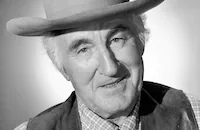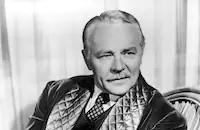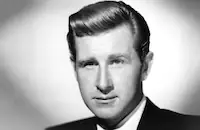Ramrod
Brief Synopsis
Cast & Crew
Andre Detoth
Joel Mccrea
Veronica Lake
Don Defore
Donald Crisp
Preston Foster
Film Details
Technical Specs

Synopsis
Connie, the daughter of cattle rancher Ben Dickason, wants to marry sheep rancher Walt Shipley, even though her father has always hoped she would marry Frank Ivey, a wealthy cattle baron. As Walt prepares to bring sheep onto his modest Circle 66 ranch, the ruthless, ambitious Ivey runs him out of town in order to keep the valley grasses solely for cattle. Walt, too scared to stand up to Ivey, leaves Connie a note calling off their engagement and willing her his ranch. Determined to fight Ivey, Connie hires young widower Dave Nash as her ramrod. While Dave, who is a drinker, is out recruiting ranch hands, Ivey's men burn Connie's ranch to the ground. With the help of Bill Schell, a fun-loving drifter, Dave hijacks a stone bunkhouse built in free range from Ivey's ramrod, Ed Burma, and Connie files a claim on the land. Ivey retaliates by ordering cowboy Virg Lea to pummel the face of Curley, one of Connie's new recruits. Connie brings Curley, blinded and bloodied, to town to be nursed by dressmaker Rose Leland, who is in love with Dave. Although Dave, who is a good friend of Sheriff Jim Crew, insists that Connie's war with Ivey be fought legally, Bill shoots Burma in cold blood in order to avenge Curley's beating. Bill pleads self-defense with the sheriff, but no one really believes Burma drew first. Impressed with Bill's willingness to take action against Ivey, Connie coyly convinces him to stampede her herd so that Dave and Jim will blame Ivey, then kisses him. After the sheriff hears about the stampede, he bravely goes alone to arrest Ivey. Ivey denies the charges and shoots Jim dead, then blames Virg for the killing. Later, Link Thomas, a Dickason ranch hand, loyally informs Connie that her own men stampeded her herd, and she confesses that she gave the order. Meanwhile, Dave finally decides to take the law into his own hands and shoots Virg. As Virg dies, he tells Dave that Ivey shot Jim. A shootout follows with another of Ivey's men, and Dave is wounded in the shoulder. A weakened Dave goes to Rose for help, and she tells him that Curley died that afternoon. Later Ivey arrives in town in pursuit of Dave and Bill, whom he has since learned had the first draw when Burma was killed. Although Bill moves Dave to a secluded mine, Connie, who has fallen in love with Dave, locates him, but inadvertently leaves a trail for Ivey. As Ivey's men approach, Bill offers to be the bait and sends Dave off on Connie's horse. Before they part, Bill confesses to Connie and Dave that he killed Burma, but Connie refrains from admitting to Dave that she ordered the stampede. Bill, forced to spend the night hiding in the rocky hills above the mine, is finally shot in the back by Ivey. By daylight, Dave reaches Ben's ranch and and learns how Bill died. Worried that Connie will blame him for Bill's death, Link reveals to Dave the truth about the stampede. The next day at dawn, Dave shoots Ivey in a gunfight. Although Connie rushes out to congratulate Dave and pleads with him to join her at the ranch, he tells her a life alone is what she deserves, then goes to Rose's. Rose greets him in a dress she made from silk he brought her, and he asks if it might do as a wedding dress.

Director

Andre Detoth
Cast

Joel Mccrea

Veronica Lake

Don Defore

Donald Crisp

Preston Foster

Arleen Whelan

Charles Ruggles

Lloyd Bridges

Nestor Paiva

Ray Teal
Houseley Stevenson
Robert Wood
Ian Macdonald

Wally Cassell
Sarah Padden
Hal Taliaferro

Jeff Corey
Vic Potel
Rose Higgins
Cliff Parkinson
Trevor Bardette
Chic York
Lorenzo Russell
Mrs. Minnie Russell
James Crawford
Sam Hirischi
Crew
Rudolph E. Abel
Eddie Armand
Graham Baker
Lionel Banks
Vernon E. Clark
Adolph Deutsch
Don Donaldson
Joe C. Gilpin
Harold Godsoe
Russell Harlan
Edith Head
Cecile Kramer
Ned Lambert
Buddy Mayer
Jack Moffitt
Alan O'dea
Rudolph Polk
Harry Redmond Jr.
Robert Rhodes
Sherman A. Rose
Herman Rotsten
George Sawley
Harry Sherman
Gene Strong
Ben Winkler

Film Details
Technical Specs

Articles
TCM Remembers Andre de Toth
Born in Mako, Hungary to the son of a civil engineer, De Toth showed an early artistic bent, having his first exhibit of paintings and sculpture at age 14 and seeing his first play produced at age 18. After obtaining his law degree from the University of Budapest, he began acting, writing and working as a cameraman for cinematographer Istvan Eiben. In 1939, he went to England, where he worked as a second unit director for Alexander Korda on The Thief of Bagdad and other films. De Toth immigrated to Hollywood in the early '40s, and worked with Korda on The Jungle Book (1942) and several other films.
He made his Hollywood directing debut with the 1943 feature, Passport to Suez, a propaganda thriller about the Nazis wanting to bomb the Suez Canal.
Impressed with his ability, Harry Cohn, head of Columbia Pictures, put the director under contract for one film and the result, None Shall Escape (1944), launched his Hollywood career. This tense, sensitive drama about a Nazi officer made to examine his actions was fascinating in its structure: Set after the war's end, the film centers around the trial of a Nazi butcher, Wilhelm Grimm (Alexander Knox), in Poland and makes excellent use of flashbacks illustrating the prosecution's testimony to form the bulk of the film. In a way, the film predicted the Nuremberg Trials after the war.
de Toth earned considerable critical acclaim with the taut, intense noir thriller Pitfall (1948) which he co-wrote. Starring Dick Powell, Lizabeth Scott and Raymond Burr, this story of a bored insurance salesman who embarks on an affair because he feels stifled in his picture-perfect home (a devoted wife, son, nice house, successful career, etc.) was striking as one of the first films to examine the American dream gone sour. De Toth followed that with a shared Oscar nomination with William Bowers for Best Original Motion Picture Story for The Gunfighter (1950), a haunting character study of a killer (Gregory Peck) trying to live down his past.
His biggest commercial hit came with House of Wax (1953), the movie that launched Vincent Price's horror film career and is still regarded as the best of all three-dimensional films to be released during that period. Unlike other directors who seemed to be dabbling with a new technique, De Toth emphasized character and plot over the special effects: Price was a sculptor rebuilding his wax figure collection (destroyed by fire) by making statues out of his murder victims. The one-eyed de Toth was an odd choice to helm a 3-D film as he could not experience the stereoscopic process, having lost an eye in his youth, but he persevered and it was the most successful 3-D film of its day.
De Toth followed that hit with some fine films: Crime Wave (1954), a hostage thriller that boasts some fine performances by Sterling Hayden and Gene Nelson and excellent location shooting on the streets of Los Angeles; The Indian Fighter (1955) an exciting Kirk Douglas vehicle about a wagon master leading his train through rough territory that won accolades for depicting the Native Americans with more depth than contemporary directors; and Day of the Outlaw (1959), the stark, stylish, low budget western about an outlaw (Burl Ives) and his gang taking over taking a small town and matching wits with one of its citizens (Robert Ryan). For many, this film best articulated many of the recurring themes in De Toth's work that would be evaluated only decades later by film scholars: survival, betrayal, the capacity for evil and complexities of human relationships.
In the early sixties film work became increasingly scarce for De Toth and he found himself relegated to directing for television: Maverick, 77 Sunset Strip and The Westerner. Tired of the limitations he was finding in Hollywood, De Toth headed to Europe in the '60s, where he found work as an uncredited consultant and location scout on David Lean's extravagant Lawrence of Arabia (1962). He directed a few films abroad, the best of which was the World War II action film Play Dirty (1968), starring Michael Caine, and then he more or less retired from active filmmaking. It was not until recently that De Toth began to receive critical recognition for his entertaining body of work. The last few years have seen several retrospectives and he enjoyed a renewed popularity at film festivals from Scotland to San Francisco. His contributions to film were recognized with the 1995 life achievement prize by the Los Angeles Film Critics Association and the publication of his autobiography, Fragments: Portraits From the Inside, as well as an interview book, De Toth on De Toth, by Anthony Slide. De Toth was married for a time to Veronica Lake (1944-1952) with whom he had two children. He is survived by his wife, Ann Green.
by Michael T. Toole

TCM Remembers Andre de Toth
Quotes
From now on, I'm going to make a life of my own. And, being a woman, I won't have to use guns.- Connie Dickason
Trivia
Notes
Luke Short's novel was serialized in Saturday Evening Post between 27 March and May 8, 1943. This film was the first venture of Enterprise Productions. Enterprise borrowed Veronica Lake, Arleen Whelan and Edith Head from Paramount for the production, and Wally Cassell from M-G-M. Lake and director Andre de Toth were married at the time of filming, and Ramrod marked their first screen collaboration. Actor Houseley Stevenson's name is misspelled onscreen as "Housely." Although the onscreen credits list Robert Wood in the role of "Link Thomas," reviews list the actor as Ward Wood. Hollywood Reporter credits Herman Rotsten with dialogue for this film, although no other source lists him. Rotsten is usually credited as a dialogue director. Hollywood Reporter news items list former M-G-M makeup man Holly Bane in the cast as a "villain," but his appearance in the final film has not been confirmed. Hollywood Reporter news items add the following information about the production: Location shooting was done at Zion National Park, Utah, where one hundred Utah natives were used as extras in a town sequence. The eighty-two-year-old log cabin used as a set for the home of "Rose" (Arleen Whelan) was sawed in half and trucked to Hollywood for future use. In early July 1946, while still on location, Ben Winkler took over as sound mixer for Buddy Mayer. Interiors for the film were shot on the Enterprise Studios lot starting July 13, 1946, at which point production manager Rudy Abel was replaced by Joe Gilpin. The film's distributor was not announced until late October 1946. Both Universal and M-G-M were listed as possible distributors while the picture was in production. As reported in Daily Variety, a Union Pacific locomotive called the "Ramrod Special" transported one hundred Hollywood celebrities to the February 21, 1947 Salt Lake City premiere, where the film was advertised as the "official" motion picture of Utah's centennial celebration. One-hundred fifty miles from Salt Lake, a nationwide radio broadcast from the train began that featured Hedda Hopper's This Is Hollywood program, with the film's stars reenacting their roles in a vignette dramatization. Art Linkletter's People Are Funny and House Party programs were also broadcast, and Erskine Johnson and George Fisher narrated the event. Utah legislators reportedly balked at the premiere's link to the centennial, and favored a premiere in Colorado, where Luke Short's story is set. The Daily Variety review of the film's preview credits Ned Lambert (with Edith Head) with "Fashions," although Eddie Armand is credited with Head in the onscreen credits.














